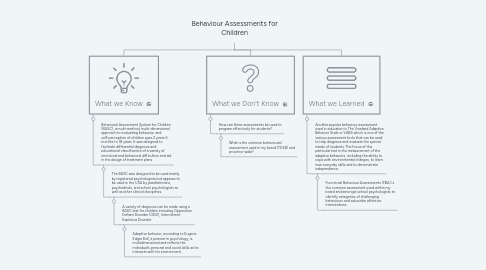
1. What we Know
1.1. Behavioral Assessment System for Children (BASC), a multi-method, multi-dimensional approach to evaluating behaviour and self-perception of children ages 2 years 6 months to 18 years. It was designed to facilitate differential diagnosis and educational classification of a variety of emotional and behavioral difficulties and aid in the design of treatment plans.
1.1.1. The BASC was designed to be used mainly by registered psychologists but appears to be used in the USA by paediatricians, psychiatrists, and school psychologists as well as other clinical disciplines.
1.1.1.1. A variety of diagnosis can be made using a BASC test for children including Opposition Defiant Disorder (ODD), Intermittent Explosive Disorder
1.1.1.1.1. Adaptive behavior, according to Eugene Edgar Doll, a pioneer in psychology, is multidimensional and reflects the individual’s personal and social skills as he interacts with his environment.
2. What we Learned
2.1. Another popular behaviour assessment used in education is The Vineland Adaptive Behavior Scale or VABS which is one of the various assessment tools that can be used to help diagnose and evaluate the special needs of students. The focus of this particular test is the measurement of the adaptive behaviors, including the ability to cope with environmental changes, to learn new everyday skills and to demonstrate independence.
2.1.1. Functional Behaviour Assessments (FBA) is the common assessment used within my board and amongst school psychologists to identify categories of challenging behaviours and subscribe effective interventions.
3. What we Don't Know
3.1. How can these assessments be used to program effectively for students?
3.1.1. What is the common behavioural assessment used in my board (TDSB) and province-wide?

